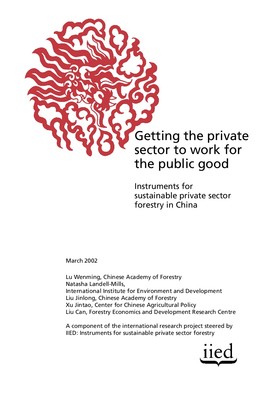Getting the Private Sector to Work for the Public Good: Instruments for sustainable private sector forestry in China

In the past two decades, China’s forestry sector has been transformed dramatically. Responsibility for forest use and management has shifted away from the state towards the private sector. Rural households have been encouraged to generate private returns from forestry investment, offered new opportunities to lease forest land, and permitted to own trees. The changes are as significant as they are diverse. Provinces, prefectures, counties, townships and even villages have adopted their own approaches to negotiating the changing roles and responsibilities between the private sector and government.
This report reviews experience and sets out potential priorities for policymakers seeking to promote sustainable private sector forestry. It looks back on twenty years of forest land tenure reform and local experiments with forestry taxation. Looking forward, the report explores emerging insights in three areas: deals between companies and local communities in forest establishment and production; payments for forest environmental services such as watershed protection and biodiversity conservation; and forest certification.
Cite this publication
Available at https://www.iied.org/9130iied